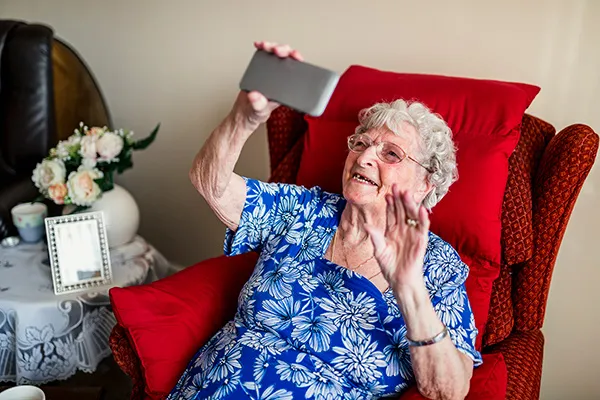Keeping up with doctor’s appointments is essential to managing health and staying informed, but it can often feel overwhelming. From scheduling and transportation to understanding medical advice and ensuring proper follow-up, there are many details to manage. This is where Understood Care can help. Our advocates serve as trusted guides, working alongside you or your loved one to make the process easier, more organized, and more comfortable.
Personalized Support Before and After Every Appointment
Understood Care advocates provide hands-on help with all aspects of medical visits. We help you schedule appointments, confirm provider information, and prepare for the visit itself. This might include reviewing your questions ahead of time, making sure prescriptions are current, or gathering any medical records needed. After the appointment, we help you understand the doctor’s recommendations and take the right steps to follow through on care instructions, referrals, or additional tests.
A Partner to Help You Understand Your Care
Medical visits can involve unfamiliar language, new diagnoses, or complex treatment plans. Your advocate is there to help translate this information into clear, understandable terms. We make sure you feel confident about what was discussed during the visit and that you know what actions to take next. If something is unclear or left unanswered, your advocate can follow up with your provider to get the information you need.
Coordination Across Your Care Team
Many people receive care from more than one doctor. Your advocate helps ensure that your care is well coordinated across primary care providers, specialists, and other professionals. We help share information between offices, keep records consistent, and make sure appointments align with your overall care goals. This reduces confusion and helps prevent important details from being overlooked.
Support for Getting to and From the Appointment
Transportation should never be the reason you miss a doctor’s visit. Your advocate helps you arrange reliable ways to get to and from appointments. Whether that means booking a ride service, coordinating with a caregiver, or finding community transportation resources, we make sure you have safe and timely access to care. We also consider mobility needs, language assistance, and other accessibility factors to support your comfort and safety.
Emotional and Practical Support Throughout
Doctor’s visits can bring up feelings of stress, uncertainty, or fatigue, especially when managing long-term conditions or complex health needs. Understood Care advocates are here to offer steady support throughout the experience. We are here to listen, provide encouragement, and help you make informed decisions without feeling overwhelmed.
Confidence in Every Step of the Journey
With Understood Care, you are never alone in managing your medical appointments. From the moment you schedule your visit to the follow-up that comes afterward, your advocate is there to help you stay organized, prepared, and empowered. We make it easier to stay connected to the care you need and to move forward with confidence.
Understanding dementia beyond memory changes
Dementia is a general term for conditions that affect memory, thinking, reasoning, personality, and behavior. These changes are strong enough to interfere with everyday life, such as paying bills, managing medicines, or finding the right words in conversation. It is more common with age, especially after 80, but it is not a normal or expected part of getting older.
Alzheimer’s disease is the most common cause of dementia. It leads to progressive damage in the brain over time. Health care teams describe stages to help you understand where you or your loved one is on the journey and what to expect next. These stages can guide planning, but the experience is still very individual.
Most types of dementia cannot be cured. That means there is currently no treatment that can completely stop or reverse the disease. At the same time, there are medicines, therapies, safety steps, and support services that can ease symptoms, maintain independence longer, and improve quality of life.
Memory changes are often the first thing people notice, but dementia affects much more than memory. You may also see:
- Trouble finding words or following conversations
- Difficulty planning, organizing, or managing finances
- Getting lost in familiar places
- Changes in mood or personality, such as irritability, anxiety, or depression
- Sleep changes, confusion in the evening, or “sundowning”
- New behaviors such as pacing, wandering, or repeating questions
These changes touch every part of life. That is why support needs to go beyond memory and include emotional health, day to day tasks, safety, relationships, and financial and legal planning.
What you might feel after a diagnosis
If you or someone you love has just been told “you have dementia” or “you have Alzheimer’s disease,” it can feel devastating. Many people describe feeling shocked, numb, afraid, or overwhelmed. You might think about all the stages ahead and wonder how you will manage each one.
Caregivers often feel:
- Grief about the changes they are already seeing
- Worry about keeping the person safe at home
- Guilt about feeling tired, frustrated, or wishing for a break
- Anger at the situation or at how the health care system works
- Loneliness, especially when friends and family do not fully understand
These reactions are common. National caregiver research shows that caring for someone with dementia affects both physical and emotional health, and caregivers have higher risks of depression, sleep problems, and chronic stress.
You may also notice what Debbie describes in the video on this page. There can be moments of clarity and connection that feel almost like “the old times.” Those moments are real and meaningful, even if they do not last. It is natural to feel hopeful when these moments appear and heartbroken when symptoms return.
At the same time, you do not have to carry this alone. There are medications, safety strategies, support groups, in home services, and advocacy programs that can help you keep a loved one at home as long as it is safe, or help you transition to a higher level of care when needed.

How treatment helps and what it cannot do
Medications for memory and thinking
Several medicines are used to treat memory and thinking symptoms in Alzheimer’s disease and some other dementias. They do not cure dementia, but they can help some people think more clearly, stay more independent, or slow down changes for a time.
Common medicines include:
- Cholinesterase inhibitors such as donepezil, rivastigmine, and galantamine. These help increase levels of a chemical messenger in the brain that supports memory and judgment. They are usually used in mild to moderate dementia and sometimes in later stages.
- Memantine, which works on a different brain chemical system and is used in moderate to severe stages, either alone or with a cholinesterase inhibitor.
These medicines can:
- Modestly improve memory, attention, or daily function in some people
- Help with planning, reasoning, or behavior for a period of time
- Delay worsening of symptoms for months to a few years in some cases
They cannot:
- Stop the disease from progressing in the long term
- Restore abilities that have been lost permanently
- Work well if doses are not taken as prescribed
Side effects can include nausea, diarrhea, loss of appetite, slow heart rate, or feeling lightheaded. It is important to review all medicines with your clinician and to report new or serious symptoms promptly.
Newer disease modifying therapies
In recent years, newer treatments called monoclonal antibodies have been approved for certain people with early Alzheimer’s disease. One example is lecanemab. These medicines target amyloid, a protein that builds up in the brain, and they may slow the rate of decline in thinking and function in some individuals.
These treatments:
- Are given by intravenous infusion on a regular schedule
- Require detailed testing to confirm the diagnosis and stage of disease
- Need regular brain imaging to monitor for side effects such as brain swelling or bleeding
They are not right for everyone, and they still do not cure Alzheimer’s, but they may be an option in early stages. A dementia specialist can explain the possible benefits, risks, and insurance coverage in your situation.
Medicines for mood, sleep, and behavior
People living with dementia may also have depression, anxiety, sleep problems, or strong behavior changes. Clinicians sometimes prescribe antidepressants, sleep medicines, or other drugs to help with these symptoms. These can be useful, but they need careful monitoring, especially for older adults who may be more sensitive to side effects like falls, confusion, or heart rhythm changes.
Always tell your clinician about every prescription, over the counter medicine, vitamin, or supplement you or your loved one takes. Never stop or change a medicine dose without medical guidance.
Understanding “moments of lucidity”
Many families notice that a person with dementia has good days and harder days. Sometimes there are brief periods of clear conversation, shared stories, or humor that feel like a “window opening.” Other times, confusion and forgetfulness are more obvious.
These ups and downs do not mean you did anything wrong, and they do not mean the disease has suddenly gone away. Dementia can fluctuate from day to day, or even hour to hour, especially when someone is tired, stressed, or ill. Cherishing the clearer moments while planning for ongoing support is an important part of this journey.
Home and community support to stay at home longer
Many families, like Debbie describes in the video, want to keep their loved one at home as long as possible. The right mix of safety steps, routine, and support services can make that more realistic and safer.
Safety and daily routines
Home can be adapted to reduce risk and make daily life easier. The National Institute on Aging recommends steps such as:
- Removing throw rugs and clutter that can cause falls
- Improving lighting in hallways, stairs, and bathrooms
- Installing grab bars and nonslip mats in the bathroom
- Locking up cleaning products, sharp tools, and medicines
- Using automatic shutoff devices or supervised access for the stove and oven
- Labeling rooms and cabinets with words or pictures
- Keeping important phone numbers and emergency contacts in large print near the phone
A simple, predictable daily routine can also lower anxiety and confusion. Regular times for waking up, meals, activities, and bedtime help the day feel more manageable for everyone.
In home services
You do not have to handle all care tasks on your own. In home support can include:
- Personal care aides who help with bathing, dressing, and grooming
- Home health nurses who monitor vital signs, wounds, or complex medicines
- Physical and occupational therapists who support strength, balance, and home safety
- Speech therapists who help with communication or swallowing
- Respite care providers who give caregivers short breaks at home or in a facility
The National Institute on Aging and other expert organizations emphasize that early use of support services can reduce caregiver burnout and help people with dementia stay at home longer.
Understood Care advocates can help you explore in home care options and understand what may be covered through Medicare or other insurance. You can learn more about how advocates coordinate home support on the Understood Care Home Care page: https://understoodcare.com/care-types/home-care
Community and social connection
Dementia affects social life too. People may withdraw because they feel embarrassed or overwhelmed. Yet social connection is a key part of emotional health for both the person with dementia and the caregiver.
Helpful community options can include:
- Adult day programs that provide supervision, activities, and social time
- Dementia friendly exercise, music, or art groups
- Support groups for people living with dementia and for caregivers
- Senior centers and faith communities that welcome people with cognitive changes
Mayo Clinic’s dementia wellness and education programs and the Alzheimer’s Association caregiving resources highlight the value of education, peer support, and specialized programs for both patients and caregivers.
Understood Care advocates can also connect you with social and community support that fits your needs and preferences. You can read more about this type of help at: https://understoodcare.com/care-types/social-support
When home is still the right place
Home may be the best place when:
- Safety risks can be managed with supervision, home changes, and assistive devices
- The caregiver has support from family, friends, respite services, or in home aides
- Medical and therapy appointments are manageable with transportation help
- The person with dementia is comfortable and engaged with meaningful activities
Debbie’s message in the video is that with the right support, many people can remain at home through multiple stages of dementia. That support includes both practical help and a caring “shoulder” for you as a caregiver.
When to consider memory care or higher support
There may come a time when care needs go beyond what is safe at home. Warning signs can include:
- Frequent wandering or leaving home without being noticed
- Serious falls or injuries despite safety steps
- Aggression or severe behavior changes that put others at risk
- Needing help with nearly every daily task around the clock
- Caregiver exhaustion, illness, or depression that is not improving
Cleveland Clinic and other leading centers recommend talking with clinicians, social workers, and care teams early about options such as memory care units, assisted living, or nursing homes, as well as home based palliative and hospice care.
These decisions are emotional and complex. You do not have to make them alone. Care teams and advocates can help you weigh safety, quality of life, finances, and your own health.
Caring for yourself as a caregiver
It is common to focus on the person with dementia and forget your own needs. Yet research from the National Institute on Aging and MedlinePlus shows that caregivers who do not take care of themselves are more likely to become sick, depressed, or burned out, which can make caregiving much harder.
Taking care of yourself is not selfish. It is essential.
Helpful steps include:
- Share the load. Ask family, friends, or neighbors to help with meals, errands, or visits. Even small tasks can make a big difference.
- Use respite care. Short term in home help, adult day programs, or respite stays in a facility give you time to rest, go to your own appointments, or simply breathe.
- Stay connected. Join caregiver support groups in person or online. Hearing from others who understand can reduce isolation and provide practical tips.
- Protect your health. Try to keep up with your own checkups, medicines, sleep, and movement, even in short bursts. Tell your clinician that you are a caregiver, so they can support you.
- Notice signs of burnout. Ongoing sadness, anger, trouble sleeping, or feeling hopeless are signals to seek extra help from a clinician, counselor, or support program.
In the video, Debbie says “we can provide that support, we can provide that shoulder.” Emotional support matters just as much as practical help. It is okay to cry, to vent, and to say “this is hard.” You deserve care too.
Understood Care advocates are trained to support caregivers as well as patients. They can listen, organize steps, and help you feel less alone while you navigate a complicated system.

How Understood Care supports you beyond memory challenges
Understood Care focuses on the whole picture, not just memory tests or medicines. Our clinicians and advocates can help you and your care partner understand the diagnosis, plan for each stage, and coordinate the many pieces of care that come with dementia.
Making sense of the diagnosis and stages
After a new diagnosis, it is easy to leave the clinic with more questions than answers. Understood Care clinicians and advocates can:
- Review past records and test results
- Explain the diagnosis and stage in plain language
- Help you prepare questions for upcoming visits
- Summarize what each stage might mean for daily life
For more detail on this type of support, visit the Alzheimer’s disease advocacy page: https://understoodcare.com/care-types/alzheimers-disease
Coordinating appointments, medicines, and safety
Dementia care almost always involves several clinicians, tests, and services. Understood Care can:
- Arrange and track appointments with primary care, neurology, and other specialists.
- Keep an organized care plan and share updates with your permission.
- Help you manage prescriptions, refills, and prior authorizations, and explore ways to lower medication costs.
- Connect you with in home support to keep daily life safer and more manageable at home.
Connecting you with social and financial support
Dementia affects finances, benefits, and social life. Advocates can:
- Identify community programs, caregiver groups, and peer support that match your needs.
- Help with applications for financial assistance programs and benefits.
- Walk you through an overview of financial support options.
Being a steady shoulder
Perhaps most important, your advocate is a consistent person you can turn to when things feel too heavy. As Debbie shares, we can help you through moments of lucidity and through the hard days, offering both practical guidance and compassionate support.
When to ask for more help
Reach out for extra help if you notice any of the following:
- You feel near your breaking point, angry or tearful more often than not
- You or your loved one are skipping medicines or appointments because managing them feels impossible
- Safety concerns at home are growing, such as repeated wandering, falls, or kitchen accidents
- You are losing weight, not sleeping, or neglecting your own health appointments
- Family conflicts about care decisions are increasing
You can:
- Talk with your primary care clinician or dementia specialist about home health, palliative care, social work support, or respite options
- Call local aging services or Alzheimer’s organizations for caregiver resources and support groups
- Reach out to an Understood Care advocate to help you organize next steps and coordinate care across your team
If someone has sudden confusion, new weakness on one side, chest pain, trouble breathing, or thoughts of self harm, call emergency services right away.
Related Reading

Frequently asked questions
What support is available to help me care for someone with dementia at home?
Support can include:
- In home aides for bathing, dressing, and meals
- Home health nurses and therapists
- Adult day programs and respite care
- Support groups for caregivers and for people living with dementia
- Care coordination and advocacy services
The National Institute on Aging and Alzheimer’s Association both offer directories of dementia caregiving resources, and Understood Care can help you connect these options into a practical plan for your family.
How can I keep my loved one safe if they want to stay at home?
Home safety steps include removing fall hazards, improving lighting, adding grab bars, locking up dangerous items, adjusting kitchen use, and planning for wandering risk. Professional home safety assessments and occupational therapy can identify additional changes that fit your home.
Understood Care advocates and clinicians can also help you apply for services like home health, home care, and transportation support to reduce risk and strain.
Is there a cure for Alzheimer’s disease or dementia?
At this time, there is no cure for Alzheimer’s disease or most other dementias. Medicines such as cholinesterase inhibitors and memantine can improve or stabilize symptoms for a period of time, and newer monoclonal antibody treatments may slow decline in early Alzheimer’s disease, but they do not stop the disease entirely.
Researchers around the world are studying new treatments and prevention strategies, but for now the focus remains on symptom control, safety, well being, and support for both patients and caregivers.
How does Understood Care support dementia and Alzheimer’s care beyond memory problems?
Understood Care looks at the full picture. Clinicians and advocates help with:
- Understanding the diagnosis and stage
- Coordinating appointments, tests, and follow ups
- Managing medicines and exploring ways to lower costs
- Planning for home safety, transportation, and in home care
- Connecting you with social, emotional, and financial support
You can read more at: https://understoodcare.com/care-types/alzheimers-disease
When should I consider memory care, assisted living, or a nursing home?
Consider a higher level of care when:
- Safety cannot be maintained at home, even with added support
- The person needs supervision day and night
- Aggression or behavior changes put others at risk
- Caregiver health is declining or burnout is severe
- Medical teams recommend more intensive support
Talk with clinicians, social workers, and care advocates about options in your area, including memory care units, assisted living, nursing homes, and home based palliative or hospice care. Planning early gives you more choices and less pressure in a crisis.
References
- Mayo Clinic. Dementia: Diagnosis and treatment. https://www.mayoclinic.org/diseases-conditions/dementia/diagnosis-treatment/drc-20352019 Mayo Clinic
- Mayo Clinic. How Alzheimer’s medicines help manage symptoms. https://www.mayoclinic.org/diseases-conditions/alzheimers-disease/in-depth/alzheimers/art-20048103 Mayo Clinic
- Cleveland Clinic. Dementia: What It Is, Causes, Symptoms, Treatment and Types. https://my.clevelandclinic.org/health/diseases/9170-dementia Cleveland Clinic
- Cleveland Clinic. Alzheimer’s Disease Stages: What They Are and Symptoms. https://my.clevelandclinic.org/health/articles/alzheimers-stages Cleveland Clinic
- Cleveland Clinic. Get Alzheimer’s Disease Treatment. https://my.clevelandclinic.org/services/alzheimers-disease-treatment Cleveland Clinic
- Harvard Health Publishing. Drugs for Alzheimer’s disease. https://www.health.harvard.edu/mind-and-mood/drugs-for-alzheimers-disease Harvard Health
- National Institute on Aging. Alzheimer’s caregiving. https://www.nia.nih.gov/health/alzheimers-caregiving National Institute on Aging
- National Institute on Aging. Alzheimer’s Caregiving: Caring for Yourself. https://www.nia.nih.gov/health/alzheimers-caregiving/alzheimers-caregiving-caring-yourself National Institute on Aging
- National Institute on Aging. Caregiving. https://www.nia.nih.gov/health/caregiving National Institute on Aging
- National Institute on Aging. Alzheimer’s Caregiving: Home Safety Tips. https://www.nia.nih.gov/health/safety/alzheimers-caregiving-home-safety-tips National Institute on Aging
- National Institute on Aging. Caregiving Toolkit: Information and Resources to Support Caregivers. https://www.nia.nih.gov/toolkits/caregiving National Institute on Aging
- MedlinePlus. Alzheimer’s caregivers. https://medlineplus.gov/alzheimerscaregivers.html MedlinePlus
- Mayo Clinic Alzheimer’s Disease Research Center. Dementia wellness and education programs. https://www.mayo.edu/research/centers-programs/alzheimers-disease-research-center/for-patients-families/dementia-wellness-education-programs Mayo Clinic
- Alzheimer’s Association. Caregiving. https://www.alz.org/help-support/caregiving Alzheimer’s Association
This content is educational and is not a substitute for medical advice. Always consult your healthcare provider for personalized care.
Want a patient advocate by your side?
Quick & EasyMeet a supporting physician today for your 20-minute intake session.
Personal SupportAt Understood Care, you're seen, heard, and cared for.









.avif)
.avif)